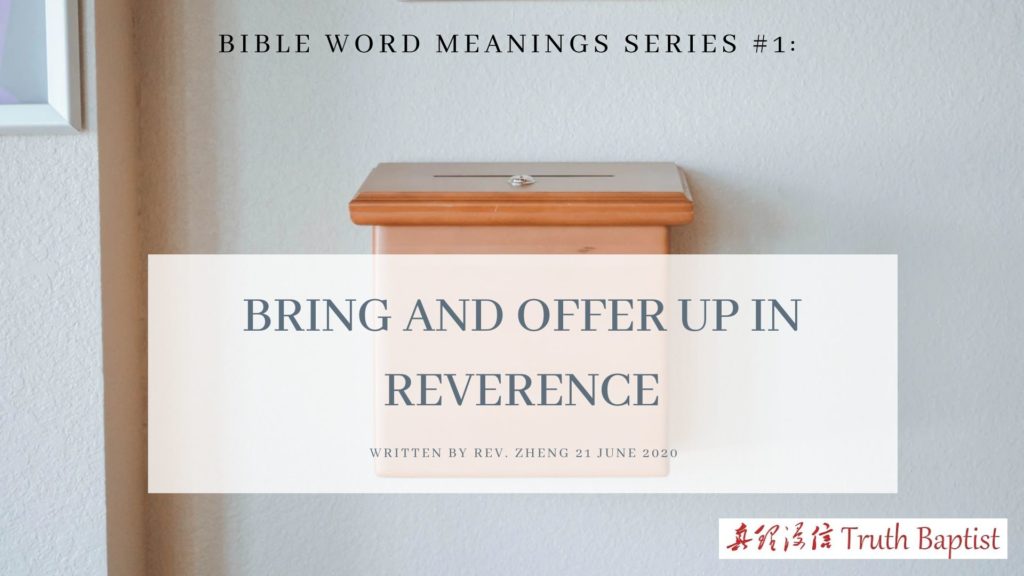
Written by Rev. Zheng 21 June 2020 Translated by Wu Weijie
“Honour the LORD with your wealth and with the firstfruits of all your produce; then your barns will be filled with plenty, and your vats will be bursting with wine.” (Pro 3:9,10 ESV)
‘Bring reverently’ and ‘Offer up’ in the Old Testament
In the Old Testament, the Israelites were commanded to bring forth their offerings to the place of worship, that is the Tent of Meeting or the Temple, and to hand it to the priests. For example,
“then to the place that the LORD your God will choose, to make his name dwell there, there you shall bring all that I command you: your burnt offerings and your sacrifices, your tithes and the contribution that you present, and all your finest vow offerings that you vow to the LORD” (Deut 12:11)
and
“Then Hezekiah said, “You have now consecrated yourselves to the LORD. Come near; bring sacrifices and thank offerings to the house of the LORD.” And the assembly brought sacrifices and thank offerings, and all who were of a willing heart brought burnt offerings. The number of the burnt offerings that the assembly brought was 70 bulls, 100 rams, and 200 lambs; all these were for a burnt offering to the LORD” (2 Chro 29:31,32)
God gave detailed and specific instructions on the requirements and conditions for the five offerings. This is to show that the act of offering should be treated solemnly and not treated casually. Both the bringing and the offering up must be done in a respectful, loving and reverent manner, just like a person of a lower position paying tributes to one of a higher position, or an inferior subject to a superior subject. God grants man, and man offer to God.
When the worshipper brings the sacrifice or gifts to the Levites or priest, he does it with reverence in a hope that when the offerings are being burnt on the altar, both him and the offerings would be accepted by God. In other words, bringing reverently is the right attitude of offering. Regardless of status, tribe leaders, nobles and kings ought to observe this manner.
After taking over the offerings brought forth by the people, the priests will proceed according to the instructions of God and slaughter the offerings and sprinkle their blood. They will then place the offerings on the altar in accordance to the instructions of offering and in reverence. The priests will burn them on burning wood, and until the smoke rises up, carrying the aroma of the offerings which signifies the praise and worship of the worshipper, the offering process is then considered as complete.
Thus, the act of offering consists of two parts: The worshipper brings the offerings to the Levites at the place of worship, and the priests offers it up to God by burning it on the altar, i.e. Bringing to and Offer up.
Other than the five offerings, gifts that are offered to the temple and tithes offered to the Levites and priest also need to be brought to the place of worship in the same manner. For example:
“And he brought into the house of the LORD the sacred gifts of his father and his own sacred gifts, silver, and gold, and vessels.” (1 Kings 15:15)
And,
“and to bring the first of our dough, and our contributions, the fruit of every tree, the wine and the oil, to the priests, to the chambers of the house of our God; and to bring to the Levites the tithes from our ground, for it is the Levites who collect the tithes in all our towns where we labour.” (Neh 10:37)
They must be brought in a respectful manner. God does not want His worshipper to think of oneself as a ‘giver’, ‘provider’, ‘donor’ or ‘investor’, but to humbly view oneself as a receiver at God’s mercy, as the God has said “I will not accept a bull from your house or goats from your folds. For every beast of the forest is mine, the cattle on a thousand hills.” (Psalms 50:9,10)
We ought to be very careful in the way we bring in our offerings. Many fervent Christians have carelessly fallen prey to the deadly lies of Satan after they made a large sum of monetary offering to the church, believing that it is by their offerings that the church is well. Let everyone of us be sure to hold on to the attitude of reverence when we offer, lest we say to ourselves one day, “I have offered so much to the church!”
‘Bring reverently ‘ and ‘Offer up’ in the New Testament

Our Lord Jesus fulfilled the five offerings, abolished the temple altar on earth and replaced the Old Testament with the New Testament. But He did not abolish the offering and tithing duties of worshippers. He released us from the bondage of legalism and gave us freedom in Christ. Hence, today we offer not based on the letter but the spirit of the law. (2 Cor 3:6) We are to offer willingly and cheerfully, like the widow who willingly offered the two small copper coins, which was all she had to live on. As it was in the Old Testament, all offerings made in the New Testament have to be brought reverently to the church and offer up to God together with the worshipper’s heart.
The offering practice in our church is to place the offering into the offering bags during the worship service. The offering bags are passed on by stewards who are carefully chosen and appointed by the church. The putting of the monetary offering into the offering bag is the act of bringing and thus has to be done reverently. The stewards are to collect them reverently also. This is why they are to put on proper attire and stand in awe, with both hands on the offering bag.
The stewards will then bring the offering bags to the front, the whole congregation will then offer up to God the entire collection through prayer. This is why the stewards ought to stand at the front and why there is an offertory prayer in addition to the invocation in the Sunday service. This is also why we do not have an offering box at the door of the church for people to drop their offerings into as they leave the church.
As we are unable to gather in-person during this period, the church has adopted the channel of online bank transfers for offerings. However, how can we keep the meaning of offering in these online bank transfers, whilst not creating a wrong concept of giving in our mind?
We are clear about what it means to bring and to offer up. The act of making the online transfer is that of bringing, i.e to bring our offertory money to the church’s bank account and hand it to the treasurer deacons appointed by the church, just like in the Old Testament the worshipper brought the offerings to the place of worship and handed it over to the Levites. It is also the same as putting our offertory money into the offering bags. We ought to do the transfer with a reverent heart.
This is why we have asked you to perform the transfer during the time of service, so that you may bring your own offering reverently into the invisible offering bags, and then the worship leader would lead us in the offering prayer to offer up what we have brought in.
At times there may be technical difficulties such as unstable internet connection. You may perform the transfer prior to the worship, that is to bring forth before the worship, and then offer it up during the service. However, we need to mindful not to offer up before bringing it in. How can we offer something that has not been brought forth?
If for some reasons you are unable to attend service for an extended period of time, you may make your offering through the online transfer at any time. Remember to offer it up to the Lord through a prayer. Because in the New Testament you are a member of God’s royal priesthood.
Some of you may be thinking of using GIRO to make your tithing, in an effort to not forget and thereby hinder the work of the Kingdom. This is very good. However, the automatic process that free the believer from making the transfer personally could mean an absence of reverence in the act of bringing, even more as the act of offering up is missing. Therefore, until we have found a way to overcome this absence, we will have to put GIRO aside for the time being.
Prepare offering in Reverence
In the Old Testament, the attitude of bringing reverently begin much earlier than the time the worshipper steps into the place of worship. He needs to prepare the offering in advance, for example, to set apart the firstborn of the herd or the flock to be an offering, or to set aside the best new wine and oil for God’s house.
Let us self-reflect: do I prepare my offerings with an attitude of reverence?
I believe many of us have at times forgotten to prepare our tithing, or bring the weekly offering, we ended up skipping the offering altogether because we did not have small change, or we reluctantly put a large note into the offering bags. Both are not pleasing to God. Preparing our offering prayerfully and with gratitude is part of bringing in reverently, and it enables us to be joyful when we offer it up to God, just as the worshipper in the Old Testament rejoices when he sees the smoke from the burning sacrifices rises up.
Joyful worship begins with an attitude of reverent bringing.
I believe attending worship service has become a Sunday routine for many of us. That is why we ought to prepare all that is needed for worship, lest the routine become mechanical. Prepare our Bible, hymnal, chairs, offerings, and even the attire for worship on Saturday with a respectful manner. With this gesture of reverence, we can then enjoy worship.
Donations and giving among believers, or the financial reliefs for the world are not offerings from man to God. They are from man to man. Hence it needs not be collected during worship service. But if these acts of kindness are done for the Lord and according to His will, it will also be offered up to Him.
Acts of kindness done for the Lord is an offering to God, and thus should be done in accordance with God’s will.
Closing
“You shall remember the LORD your God, for it is he who gives you power to get wealth, that he may confirm his covenant that he: swore to your fathers, as it is this day.” (Deut 8:18)
God is in heaven and we are on earth, hence, man ought to offer up to God with an attitude of reverence. Bringing to the house of God in a casual or careless manner, the worshipper as well as the offering will not be acceptable to God. Therefore, as we explore new electronic channels and means to make offering more convenient, let us be careful not to lose the heart of thanksgiving, reliance on God and honour to God!


0 Comments